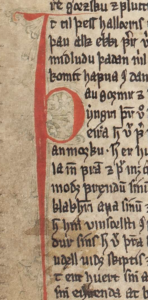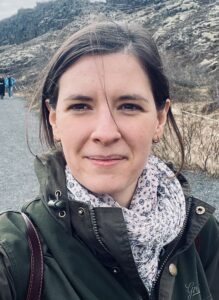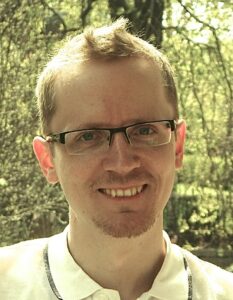Málþing á vegum Miðaldastofu Háskóla Íslands — A University of Iceland Centre for Medieval Studies Symposium
Föstudaginn 27. október 2023 kl. 14.00-17.00 — Friday, October 27, 2023, at 14.00-17.00
Fyrirlestrasal Eddu — Edda auditorium
Dagskrá — Program:
 14.00-14.30 Bianca Patria, University of Oslo: Pseudo-Egill, the Víkingr Poet
14.00-14.30 Bianca Patria, University of Oslo: Pseudo-Egill, the Víkingr Poet
14.30-15.00 Klaus Johan Myrvoll, University of Stavanger: Did the Norwegians Understand Skaldic Poetry?
15.00-15.30 Leiv Olsen, University of Iceland: Are There Still Too Many Emendations in Skaldic Poetry?
15.30-16.00 Kaffihlé — Coffee Break
16.00-16.30 Mikael Males, University of Oslo: The Skald’s Victory over Formal Constraints
16.30-17.00 Haukur Þorgeirsson, Árni Magnússon Institute: Words for Witchcraft
Málþingið fer fram á ensku og er öllum opið. — The symposium will be conducted in English. All are welcome to attend.
Miðaldastofa Háskóla Íslands — The University of Iceland Center for Medieval Studies
—o—o—o—
Bianca Patria
Pseudo-Egill, the Víkingr Poet

This presentation will focus on a lausavísa contained in chapter 49 of Egils saga, concerning a sea-battle between Egill and Þórólfr, on the one hand, and a villain named Eyvindr skreyja on the other, who is introduced in the saga as the brother of Queen Gunnhildr. The lausavísa contains several indications of being a product of the saga author, rather than of the historical Egill, to whom it is attributed. The stanza will first be compared to other sources about the elusive figure of Eyvindr skreyja, in particular the poetic ones, namely lausavísur 3–5 by Eyvindr skáldaspillir Finnsson, first attested in Fagrskinna. It will then be analysed formally and metrically, contrasting its characeristics with the ones observed in other pseudonymous stanzas in Egils saga. The analysis will reveal traits that are typical of the poetry of Pseudo-Egill, some of which have gone unnoticed until now, including the fondness for the use of the word víkingr (otherwise rare in tenth-century verse), as well as a systematic and creative use of echoes from earlier poems.
Bianca Patria is a postdoctoral research fellow in Old Norse Philology at the Department of Linguistics and Scandinavian Studies of the University of Oslo. She is currently a member of the research project Norrøn poesi og utviklingen av saga litteratur. Her interests include Old Norse and Germanic poetry, historical linguistics, and metrics, while her research focuses mainly on the diction of skaldic poetry.
—o—
Klaus Johan Myrvoll
Did the Norwegians Understand Skaldic Poetry?

A widespread conception among Old Norse scholars is that, in the Middle Ages, only Icelanders could handle considerable amounts of skaldic poetry and thus be able to write sagas in a fully developed prosimetrum. The claim is that Norwegians lacked the knowledge necessary to produce such elaborate prosimetra, skaldic poetry being cultivated by Icelanders and poorly understood by Norwegians. A game-changer in this debate was the unearthing of skaldic poetry on runic sticks from Bryggen, Bergen, in the 1950s. Not only are some of these inscriptions in fully fledged dróttkvætt; they are also all written – and composed! – in the contemporary Old Norwegian language of the thirteenth and fourteenth centuries. This shows that knowledge of skaldic poetry did exist among Norwegians at the time of saga writing, and the question of provenance for many kings’ sagas opens anew. This paper will explore the implications of the Bryggen findings for Fagrskinna and the oldest Óláfs saga helga.
Klaus Johan Myrvoll is professor of Nordic Linguistics at the University of Stavanger. He is currently co-leader of the research project Old Norse poetry and the development of saga literature. Myrvoll has published on a wide range of topics, including Old Norse metrics, skaldic poetry, historical-comparative linguistics, name studies and runology.
—o—
Leiv Olsen
Are There Still Too Many Emendations in Skaldic Poetry?

When we have problems understanding a skaldic poem, the solution has often been to emend it. But are emendations needed? Over time, philologists have found solutions without emendations on problems which were declared insoluble. Many emendations in Den norsk-islandske skjaldedigtning edition have been solved in the new Skaldic Poetry edition. After all, we could do without these emendations. Still, there are great many proposed emendations in the poetry, and they may be different and contradicting. I have tried to find solutions without emendations, and with very few exceptions, I have found possible solutions. I claim that almost all poems can be given a meaningful interpretation without emendations, only by correct understanding of the correct words in the manuscripts.
There are many faults in the manuscripts, and it is often difficult to find the meaning in the texts. But emendations are risky. We cannot know if proposed emendations will bring the text closer to the original — or, on the contrary, add new faults to the “old” ones. We should work hard to find meaning in the texts we have in the manuscripts. Everyone will agree on that, but are we working hard enough to look for meaningful solutions?
A few established emendations give meanings which seem to be the opposite of what the skald intended. Many more emendations fail to express the very striking wording the artist had chosen. Some emendations ignore the striking visualizations the skald had formulated. Skáldskapr was an art, the skalds created formulations well-adjusted to each individual case, and they were clever to find visualizing wordings — often very vivid allegories. They could tell stories “between the lines” at the same time as they told the main story with words “on the line”.
I cannot be sure that the solutions I present are better than solutions proposed by others. But I can present solutions which do not presuppose any emendations. Are those solutions sound? And should philologists be much more eager to search for solutions without emendations, and to search for the artistic traits in the poems?
Leiv Olsen is a Ph.D. student at the University of Iceland. He holds an MA in Norse philology from the University of Bergen and a cand. philol. in history, also from the University of Bergen.
—o—
Mikael Males
The Skald’s Victory over Formal Constraints

In one half stanza, Hofgarða-Refr eulogizes his skaldic teacher, Gizurr, using the metre alhent, with rhyme on four out of six syllables per line. Nearly all of it rhyming, and some 20 metrical constraints beyond that; — can Refr actually convey anything of poetic value under such circumstances? The talk will suggest that he does so more than many, presenting sophisticated allusions both to the mythological sphere and to cultural conventions relating to the production and exchange of poetry. If Refr could achieve this in an almost impossibly complex metre, then scholars need to think long and hard about the common claim that skalds based their choice of words on metrical constraints and on the stereotypical kenning “system”.
Mikael Males is professor of Old Norse philology at the University of Oslo. He specialises in Old Norse poetry but has also published on grammatical literature, exegesis, medieval etymology, textual criticism, and Irish influence on Old Norse.
—o—
Haukur Þorgeirsson
Words for Witchcraft

Icelandic manuscripts of the 19th century contain many spells, prayers, and incantations. These texts can be of interest to scholars of Old Norse since they incorporate and build on medieval material, sometimes not preserved in older Icelandic sources. In some cases, very late Icelandic texts have parallels in medieval Scandinavian runic inscriptions. This talk will analyse an eclectic selection of short texts preserved in late Icelandic sources. The cast of characters includes Saint Mary and Óðinn.
Haukur Þorgeirsson is research professor at the Árni Magnússon Institute for Icelandic studies. His interests include Old Norse and later Icelandic poetry, historical linguistics, and metrics.
—o—
Málþingið fer fram á ensku og er öllum opið.
The symposium will be conducted in English. All are welcome to attend.
Miðaldastofa Háskóla Íslands — The University of Iceland Center for Medieval Studies
